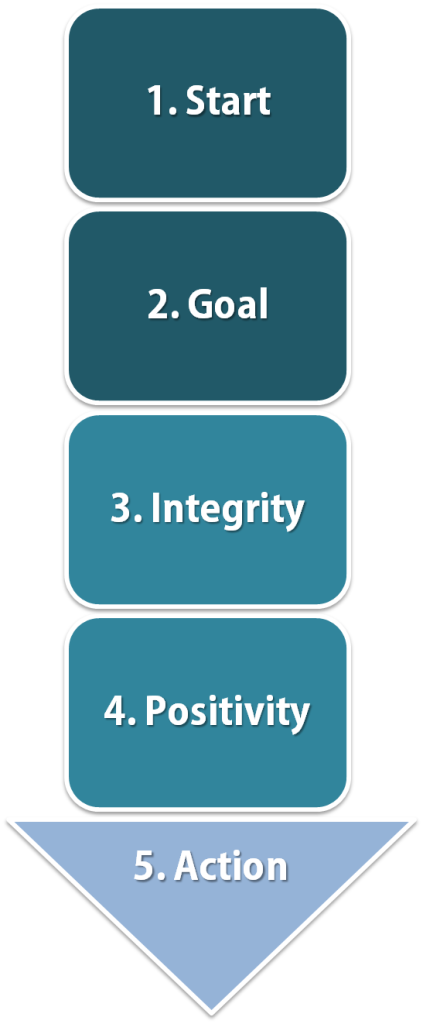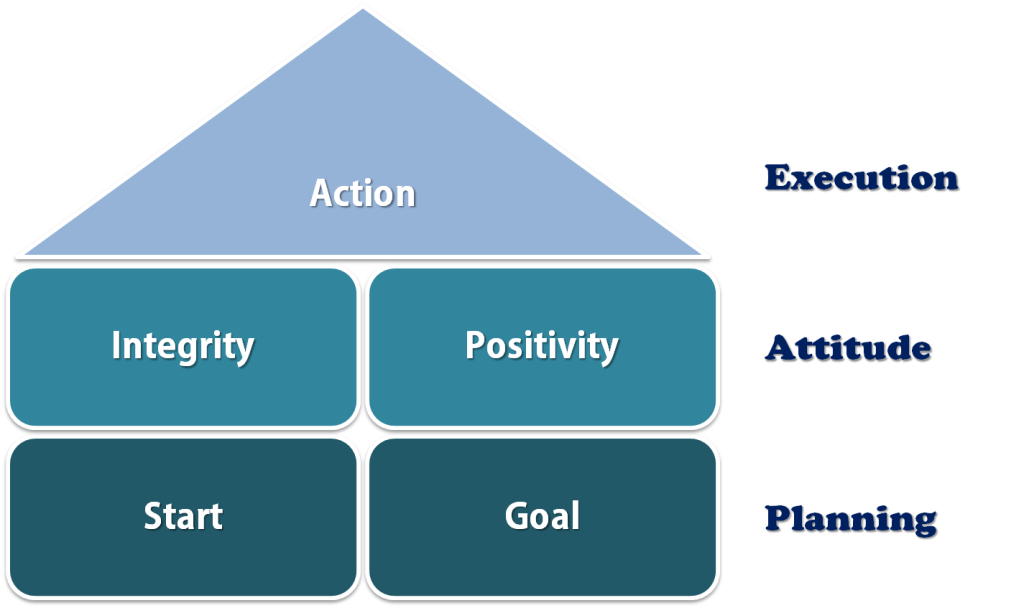Regardless of what you want to tackle, it may be a small task at work, a substantial project or an epic life-changing endeavor, it requires some type of action to be achieved. And it requires effective action to make you happy.
DO’s Five Golden Rules for Effective Action

1. Know Your Starting Point
Be able to exactly define your starting conditions.
2. Know Your Goal
Be able to exactly define where you want to go.
3. Live Integrity
Always be honest to everyone, most of all yourself.
4. Be Positive
Remove negativity from your life.
5. Do it
Enough talk. Start now!
The links behind each rule will lead you to more detailed descriptions of the rules and their meaning.
Essentially whatever you trying to achieve requires three key elements to be successful. These three elements, which are represented by the Five Golden Rules for Effective Action are: Planning (Rule 1+2), Attitude (Rule 3+4), and Execution (Rule 5).
The Five Golden Rules are the essence of what I have observed to be most successful during years of project work, managing teams and most of all dealing with many different people. These rules describe not just a road map but a mindset for effective action. Of course there are other ways to go about anything you want to do, but I noticed that people who have continuous and sustainable success, seem to follow certain rules for every venture they tackle. These basic rules build their foundation or framework for effective action.
Like when building a house you need a strong framework before you can set up the roof. All the time management tips and efficiency guidelines available will help you optimize your processes of action in certain areas as long as your framework for effective action is in place, but will fail when you are not consistent in your actions. It is like decorating a ramshackle hut with a broken framework – pretty pointless.
Such a framework is described by my five rules.
Framework for Effective Action
Without clearly defining your start point and goal you won’t be able to determine the steps necessary to get from point A to point B. If you don’t have the right attitude you are likely to get off course and of course nothing will happen when you never actually start taking some action.
Scale and Situation Don’t Matter
The size of your planned venture does not matter, because it only determines the investment in time and effort needed to be successful. Why seem some people to be successful in everything they are doing? I am convinced it is because they consistently follow their own principles. There is no separation between work and personal time.
So for example when you wanted to learn to knit you should not treat this plan differently than an assignment at work. No matter whether you want to plan a trip, remodel your home, lose some weight, train your dog, start your own business, or just find ways to earn some money on the side; all these plans can be accomplished by following the same rules. The Five Golden Rules for Effective Action can be applied to any task /venture /endeavor you are about to start.
Example:
When learning a language you need to realize what you know about the language before you start (Rule 1).
Then set a goal of what skill level you want to reach in what amount of time (Rule 2). More precisely before you start you need to know what this skill level goal exactly means. This could be the number of words learned, sentences you will be able to speak, type of topics you may cover, grade of fluency or clarity of pronunciation you will have reached .
When you are always adhere to your principles and are honest about your personal achievements and failures along the way (Rule 3) you are able to adjust whatever needs adjusting to reach your goal.
You also have to be open enough to notice and act on needed modifications such as changing the methods, adapting your schedule, increasing the amount of work you need to put in, and so on. And only if you are positive and never stop believing in yourself you won’t just quit (Rule 4).
Finally, only when you keep doing what needs to be done every single tiny step at a time you will get where you want.
Don’t forget: Dreams are only projects about to be started.
